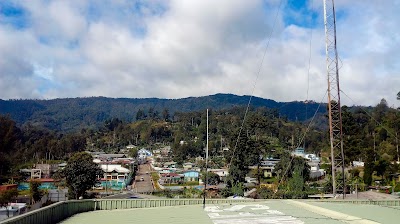Hela's Traditional Villages (Hela's Traditional Villages)
Overview
Nestled in the highlands of Papua New Guinea, Hela's Traditional Villages offer an immersive experience into one of the region's most fascinating and vibrant cultures. Known as the "Land of the Huli," the province of Hela is celebrated for its rich traditions, stunning landscapes, and the warm hospitality of its people. For foreign tourists seeking an authentic cultural encounter, these villages present a unique opportunity to step back in time and witness a way of life preserved for generations.
The Huli people, the primary inhabitants of Hela, boast a history that spans over a thousand years. They are renowned for their elaborate headdresses made from the feathers of the bird of paradise, striking face paint, and traditional ceremonies that play a vital role in their daily lives. These intricately crafted headdresses are not merely decorative; they symbolize social status, masculinity, and a spiritual connection, reflecting the Huli's deep respect for nature and their ancestral heritage.
The traditional villages themselves showcase the Huli's architectural ingenuity. Typically composed of round huts made from local materials such as wood, bamboo, and kunai grass, the village layout is meticulously designed to align with social and familial structures. Men and women live separately, with men residing in communal "men's houses," which serve as living quarters and spaces for warrior training and spiritual rituals. Women and children have designated areas within the village, reflecting their roles and responsibilities in Huli society.
Visiting Hela’s Traditional Villages offers more than just a visual feast; it's an educational journey into the Huli way of life. Tourists can engage with village elders and participate in traditional activities like cooking, crafting, and gardening. One highlight is learning about the Huli wigmen and their intricate wig-making process. These wigs, grown from their hair and meticulously cared for, can take years to complete. The art of wig-making is a significant rite of passage for young Huli men, symbolizing their transition into adulthood.
The significance of Hela’s Traditional Villages extends beyond cultural preservation; they exemplify sustainable living. The Huli's traditional practices are deeply intertwined with their environment, showcasing a profound understanding of ecological balance. Their farming techniques, hunting methods, and resource use are carried out with respect and mindfulness, ensuring the sustainability of the land they rely on.
Interesting facts about these villages further enrich the tapestry of Huli culture. The Huli have a unique belief system that venerates land and natural elements. They believe in "dama," spirits that inhabit the natural world, often invoked in various rituals and ceremonies. This spiritual connection with nature is evident in their daily activities, emphasizing harmony and coexistence with their surroundings.
Another captivating aspect of Huli culture is their oral traditions. Storytelling, songs, and dances play a crucial role in passing down knowledge, history, and moral lessons. Visitors are often treated to mesmerizing performances that convey ancient stories, offering a glimpse into the values and collective memory of the Huli people. These performances are not merely entertainment; they are vital for preserving cultural identity and continuity.
Travelers will also be intrigued by the Huli’s intricate body art, which includes body painting and scarification. These practices hold profound cultural and spiritual significance beyond aesthetics. Each design and pattern tells a story, marks an achievement, or signifies an individual's role within the community.
In conclusion, Hela’s Traditional Villages provide an unparalleled cultural experience that is both educational and engaging. The Huli people, with their deep-rooted traditions, elaborate rituals, and profound respect for nature, offer a rare insight into a society that has maintained its essence through centuries. Stepping into these villages is akin to entering a living museum, where every aspect of life vividly represents the Huli’s rich cultural legacy. Whether exploring their architectural marvels, participating in traditional ceremonies, or simply engaging with the local people, your visit to Hela's Traditional Villages promises to be an unforgettable journey into the heart of Papua New Guinea.



